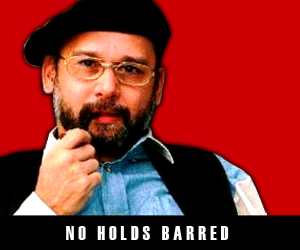Reply to Cheong Knooi Cheng
You also say that the Malays are economically weak because they place too much attention on spiritual development instead of economic development. So, are you saying that to become rich you must become less religious? Are you sharing the secret of the Chinese economic success?
NO HOLDS BARRED
Raja Petra Kamarudin
Dear Cheong Knooi Cheng,
I am responding to your letter, Questions for YTM Raja Petra Kamarudin (READ HERE), as follows:
Question 1:
You have used the term ‘religious extremists’? Can you define what you mean by ‘religious extremists’ because I am not too clear about what you mean by that term in the context that you perceive the acts of those you call ‘religious extremists’?
While on that subject, the term ‘Muslim fundamentalists’, ‘liberal Muslims’, and so on, are equally misleading because the word ‘extreme’, ‘liberal’, ‘fundamental’, and so on, can mean different things to different people depending on your value system.
I feel that only the first sentence in question one is a question. As for the rest of what you said in that paragraph, you are not asking a question but making a statement. Hence there is nothing for me to reply to. You merely expressed your views and you are entitled to your views.
The same applies to your other two ‘questions’ as well. Questions two and three are actually statements rather than questions and represent your view or how you perceive things. Hence, as I said, you are entitled to your views and there is nothing for me to reply.
Question 4:
Now, question 4 is very interesting although it is still a statement rather than a question. You said, “Sir, do you agree if I say the Malays remain weak despite government aid and initiatives to improve their lot because the majority prioritize spiritual development (or the 3R) rather than economic development?”
In court the lawyers would say, “I put it to you…..” and you respond with either a ‘yes’ or a ‘no’. It is a single word response that the lawyers require, which is also what you want from me — ‘yes’ or ‘no’ that the Malays remain weak.
Before I can even reply ‘yes’ or ‘no’ we first need to define what you mean by weak. Do you mean morally weak? Do you mean spiritually weak? Do you mean financially weak? Do you mean academically weak? Do you mean physically weak? Which ‘weak’ do you mean here?
For example, you may consider the Malays as spiritually weak. But when they become spiritually strong you call them religious extremists. And when they pray and at the same time drink beer you call them liberal Muslims. But Malays who pray and at the same time drink are considered fasiq in Islam. Hence what may be liberal Muslims to you, which means good Muslims as far as you are concerned, would be considered bad Muslims who are hypocrites who pray and at the same time drink.
Hence ‘good’ and ‘bad’ are relative and, as I said, all depends on your value system. But when you apply your values to pass judgment or make statements, then we end up with the conundrum that you are facing where ‘good’ Muslims are those who are hypocrites (pray and yet do the opposite of what Islam dictates) while ‘bad’ Muslims are those who faithfully follow Islam and whom you regard as extremists.
Anyway, let us assume that you mean the Malays are economically weak. And you probably gauge this based on the fact that 90% of the personal income tax is paid by the Chinese while most businesses in the big towns and cities are Chinese owned.
Is this what you are saying? Well, at the same time, while you admit that the Chinese control the economy, you resent the government policies that are aimed at helping the Malays to catch up. And your excuse, of course, is that you do not oppose the policy but the abuse of the policy.
Is this not a contradiction? You accuse the Malays of being economically weak and at the same time you accuse the government of racism when it tries to help the Malays economically.
You also say that the Malays are economically weak because they place too much attention on spiritual development instead of economic development. So, are you saying that to become rich you must become less religious? Are you sharing the secret of the Chinese economic success?
Question 5:
In response to this question, why don’t you contact the US Embassy or the British High Commission the soonest possible to find out, as you asked, “….the methodology or procedure to move away or migrate to other countries when all hell breaks loose.” If you want you can also contact one of the many immigration lawyers here in the UK who, for a few thousand Ringgit, can advice you and even help fill in the forms for you.
As for the rest of question 5, I do not really know what relevance it has to a foreign country’s immigration policy. Anyway, yet again, you are making a statement rather than asking a question.


